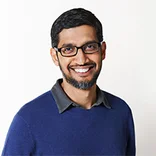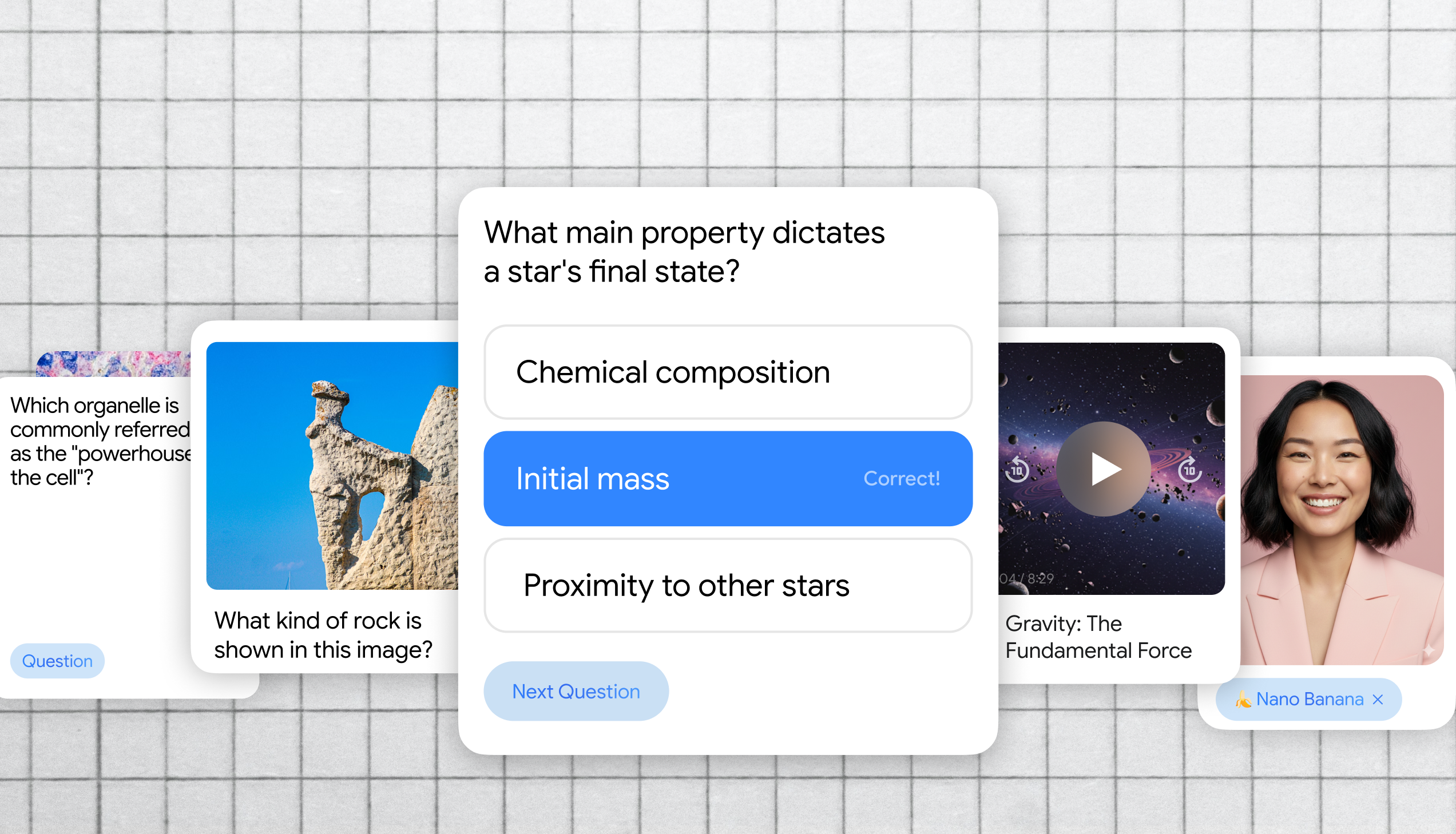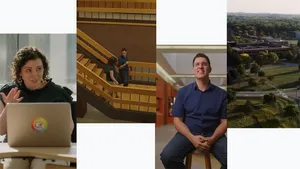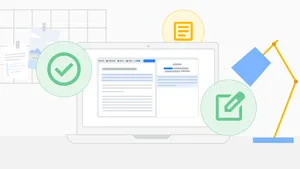Opportunity for everyone

Editor’s note: Today in Pittsburgh, PA, we announced three initiatives that expand on our efforts to create more opportunity for everyone: Grow with Google, a new initiative to help Americans with the skills they need to get a job or grow their business, $1 billion in Google.org grants over five years to nonprofits around the world, and 1 million hours that Googlers can volunteer to nonprofits. This is a modified version of the remarks our CEO Sundar Pichai gave at today’s event.
To me Pittsburgh is a special place. It was the first city I saw in America when I came here 24 years ago. It was the first time I left India. In fact, it was the first time I’d been inside a plane. My aunt and uncle have lived here for over 30 years and were kind enough to let me stay with them for a few days. My aunt took me to see my first mall in the U.S. I remember riding up and the down the hills of the city, feeling a little carsick. It’s pretty hilly down here. We even went on a road trip to see the Niagara Falls, but what I really remember was when my uncle pointed out a Cadillac on the road. I had only seen Cadillacs in movies before, and that was pretty amazing to see.
When people talked about Pittsburgh, they typically talked about the pioneers of the industrial revolution and steel. But to me, Pittsburgh was about an amazing university, Carnegie Mellon, and its great computer science department. I was here before the Internet really took off, but the city was already changing. The number of high-tech jobs had doubled. And the pace of change has never slowed since. As a new arrival, I was homesick but struck by something new: the sense of optimism.
I remain a technology optimist. Not because I believe in technology, but because I believe in people.
At Google, our mission is to make sure that information serves everyone, not just a few. A child in a school here in Pittsburgh can access the same information on Google as a professor at Carnegie Mellon. In the end, the Internet is a powerful equalizer, capable of propelling new ideas and people forward.
It means that people like Nisha Blackwell can use Google’s tools to bounce back from being laid off from a coffee shop. And to do it not by looking for work, but by pursuing their passions; to become entrepreneurs. She learned how to sew and make bow ties on YouTube. She attended a Google-sponsored program aimed at urban entrepreneurs that inspired her to start Knotzland, a handcrafted bowtie company that she runs out of the Homewood neighborhood. Nisha is here with us today and we’re humbled by the impact she’s had on her community.
We also think better access to information can revitalize local and family businesses in today’s economy. A fire and the financial crisis of 2008 forced Scott Baker’s family baking business that had been around since 1875 into bankruptcy. He rebuilt his family’s heritage on a new digital foundation: He restarted the business as 5 Generation Bakers and uses Google’s tools to reach consumers across the northeast. The Jenny Lee swirl bread that’s been his family’s trademark is still available to buy, marketed in an entirely new way. Scott, we’re glad to have you with us today, and I look forward to having some swirl bread later.
Nisha and Scott’s stories are inspiring, but they’re also inspiringly normal. These kinds of transformations happen across the city, across the state, across the nation, every day. In Pennsylvania, about 58,000 businesses and nonprofits use our search and advertising tools to grow. We estimate last year that those tools helped generate economic activity of about $6.32 billion in this state alone. And when you look across the nation that impact rises to at least $222 billion. And that’s because they’re built for everyone.
We think the Internet should allow everyone to become a developer, entrepreneur or creator, and we build our platforms around that. Researchers estimate that Android supported about 1.3 million developer jobs in the U.S. in 2016. Last year in the U.S., we paid out $13.5 billion to a range of distribution and content partners. That includes news publishers, developers and all those YouTube creators.
We’re always asking how we can make sure the opportunities created by new technology are available for everyone, in any city, in any state.
In asking that, we recognize that there are large gaps in opportunity across the U.S.
These are tough gaps. For instance, the nature of work is fundamentally changing. And that is shifting the link between education, training and opportunity. Young people already feel this. An Economist survey found that less than half of 18- to 25-year-olds believe their education gives them the skills they need to enter today’s workforce. That’s a significant gap that’s only going to become more urgent. One-third of jobs in 2020 will require skills that aren’t common today.
It’s a big problem and, at Google, whenever we see a big problem, we ask how we can make it easier for everyone to solve it.
We’ve been looking at our products for new opportunities to help people navigate this new terrain. We recently used machine learning to find a new way to search for job postings that cluster jobs by location, sector and industry. And it works. Since launching earlier this year, we have connected tens of millions of people to new job opportunities. The number of job postings appearing on Google Search in Pittsburgh has increased six-fold.
We’ve also been looking outside of Google for fresh approaches. Since 2005, 1 percent of our profits have gone to finding innovative nonprofits and helping them expand with funding, tools, and volunteers from around Google. Just in the past few months, we’ve committed $100 million to nonprofits tackling gaps in the labor market and in education. Today, we’re committing a further $20 million to organizations including UNHCR, Learning Equality, and Room to Read.
We’re seeing how hard educational gaps can be overcome. We’ve already brought down the price of schoolroom tech through Google for Education and over 70 million teachers and students worldwide use our free education products.
But technology alone isn't enough, and even with tech, some schools are struggling. The Dynamic Learning Project makes sure that teachers have the coaching they need to get the most out of whatever tech resources they have. We’re working on this in 50 underserved schools, and 11 of them are in Allegheny County. I’ll be visiting one later today.
That’s one example among many. As we looked across all our programs, we saw three ways to greatly enhance opportunity for everyone. And we’re announcing them today.
We’re launching Grow with Google, a new initiative to help Americans with the skills they need to get a job or grow their business.
Globally, we will provide $1 billion in grants over the next five years to nonprofits working on three key areas that we think will boost opportunity.
Finally, Googlers can volunteer 1 million hours to help these front-line organizations.
First, Grow with Google is there to give anyone in America the tools and training they need to get a job, for free. We understand there’s uncertainty and even concern about the pace of technological change. But we know that technology will be an engine of America’s growth for years to come.
We’ve launched an online hub—google.com/grow—where job seekers, teachers, local business owners, and developers can get significant training and professional certificates.
So if you’re looking to learn or teach the skills that employers value, look up Applied Digital Skills. We’ve been workshopping this with 27,000 students at middle and high schools. It teaches you the basics of working with tech in the modern world: from spreadsheets to email. It’s now available to everyone, and we’re looking to expand it to community colleges and vocational programs. We’re also launching a G Suite certification that will allow people to prove their proficiency in essential workplace tools.
For people who want to get closer to tech, we’re also putting together programs to make IT far more accessible as a career. In January we’ll launch a first-of-its-kind program in IT support that we developed on Coursera. The IT Support Professional Certificate includes hands-on labs to take learners to job readiness in eight to 12 months. We will sponsor 2,600 full scholarships through non-profit organizations; 100 of them will go to an organization here in Pittsburgh, Partner4Work. To ensure these courses directly translate into jobs, we’re connecting graduates with potential employers including Bank of America, L'Oreal, PNC Bank, and, of course, Google.
And for people who want to build tech directly, I can’t think of a better start than becoming a developer. We’re launching the Google Developer Scholarship Challenge, a rigorous training program, free of charge. This is a partnership with Udacity to offer 50,000 scholarship opportunities for people who want to build things on the web and Android.
All these programs are available wherever you have an Internet connection. But we also recognize that there’s no substitute for meeting people when you’re looking to switch careers or move your life into new territory.
So we’re launching a Grow with Google tour. Googlers will team up with libraries and community organizations across the country to host these events. We’ll provide career advice and training for people and businesses, including helping small businesses get online. Our first stop is Pittsburgh. The next stop will be Indianapolis, another fast-growing city for technology jobs.
I’m optimistic about the impact that these programs will have. But as I said before, we’re looking for a bigger change. That requires a deeper partnership with the people working on these gaps around the world.
And that’s why we’re committing to give $1 billion to front-line organizations addressing these challenges over five years.
Google.org will use its philanthropic expertise to fund organizations working in three areas: closing the world’s education gap, helping people prepare for the changing nature of work, and ensuring that no one is excluded from opportunity.
I already spoke of some grants in these areas. Today, we’re announcing $10 million in support of Goodwill, the United States’ largest workforce development nonprofit, to launch the Goodwill Digital Career Accelerator. It is the largest grant Google.org has ever given to a single organization.
Goodwill has phenomenal reach. Over 80 percent of Americans live within 10 miles of its centers. And it has a long record of helping people who despaired of ever getting work again. With our support, it will be able to offer 1.2 million people digital skills and career opportunities in all 156 Goodwills across every state over the next three years. We also have an open invitation to nonprofits to submit their ideas to address economic opportunity in Pittsburgh to the Pittsburgh Impact Challenge; the winners will get funds and mentoring from Google.
We hope these nonprofits will find these funds transformative.
We’ve always believed that to truly help organizations, you have to offer your time along with your philanthropy.
Googlers are committing 1 million employee volunteer hours over five years to help organizations working on the front lines of these issues. The volunteering can take many forms. Sometimes, it’s just showing up to help set up an event. Sometimes, we take a close look at technical issues nonprofits might be having and help them innovate more quickly. Googlers staffed a 4-H booth at the Illinois State Fair aimed at getting kids excited about science and tech.
In the case of Goodwill, 1,000 Googlers plan to be available to do career coaching over the next three years. Tech can seem intimidating. But we’ve found that having role models and people right in front of you can make the journey seem much easier. We think our philanthropy has to be paired with our people to be effective. We hope that 1 million hours can help make a difference.
At the end of the day, we make the most progress by working together. What you here in Pittsburgh and what people across America do with our tools and resources is what counts. We don’t have all the answers. The people closest to the problem are usually the people closest to the solution. We want to help them reach it sooner.
I said earlier how Pittsburgh amazed me when I first arrived here. And I feel that more than ever today. I’m excited to see all the ways the people of this city will build a future that works for them, and for everyone.







